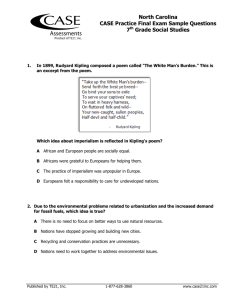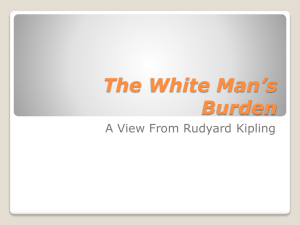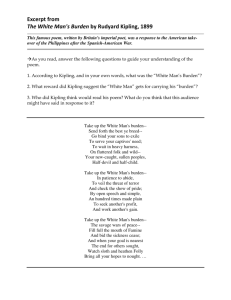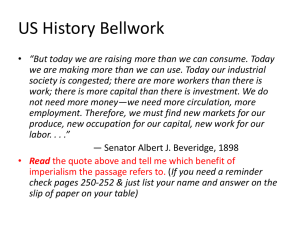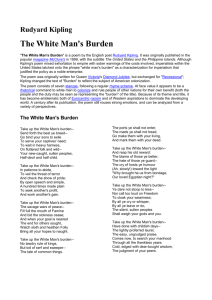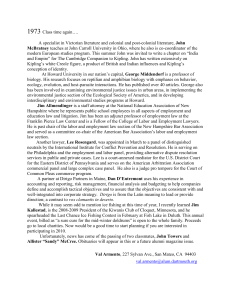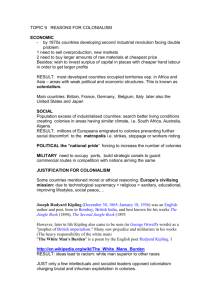The White Man's Burden
advertisement
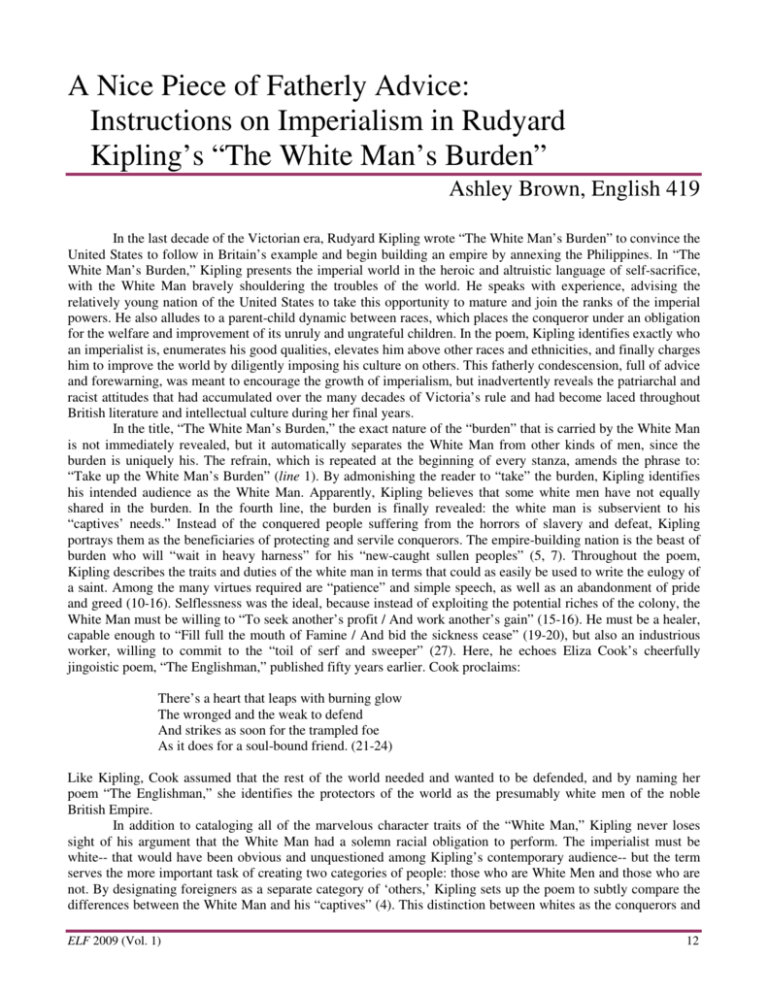
A Nice Piece of Fatherly Advice: Instructions on Imperialism in Rudyard Kipling’s “The White Man’s Burden” Ashley Brown, English 419 In the last decade of the Victorian era, Rudyard Kipling wrote “The White Man’s Burden” to convince the United States to follow in Britain’s example and begin building an empire by annexing the Philippines. In “The White Man’s Burden,” Kipling presents the imperial world in the heroic and altruistic language of self-sacrifice, with the White Man bravely shouldering the troubles of the world. He speaks with experience, advising the relatively young nation of the United States to take this opportunity to mature and join the ranks of the imperial powers. He also alludes to a parent-child dynamic between races, which places the conqueror under an obligation for the welfare and improvement of its unruly and ungrateful children. In the poem, Kipling identifies exactly who an imperialist is, enumerates his good qualities, elevates him above other races and ethnicities, and finally charges him to improve the world by diligently imposing his culture on others. This fatherly condescension, full of advice and forewarning, was meant to encourage the growth of imperialism, but inadvertently reveals the patriarchal and racist attitudes that had accumulated over the many decades of Victoria’s rule and had become laced throughout British literature and intellectual culture during her final years. In the title, “The White Man’s Burden,” the exact nature of the “burden” that is carried by the White Man is not immediately revealed, but it automatically separates the White Man from other kinds of men, since the burden is uniquely his. The refrain, which is repeated at the beginning of every stanza, amends the phrase to: “Take up the White Man’s Burden” (line 1). By admonishing the reader to “take” the burden, Kipling identifies his intended audience as the White Man. Apparently, Kipling believes that some white men have not equally shared in the burden. In the fourth line, the burden is finally revealed: the white man is subservient to his “captives’ needs.” Instead of the conquered people suffering from the horrors of slavery and defeat, Kipling portrays them as the beneficiaries of protecting and servile conquerors. The empire-building nation is the beast of burden who will “wait in heavy harness” for his “new-caught sullen peoples” (5, 7). Throughout the poem, Kipling describes the traits and duties of the white man in terms that could as easily be used to write the eulogy of a saint. Among the many virtues required are “patience” and simple speech, as well as an abandonment of pride and greed (10-16). Selflessness was the ideal, because instead of exploiting the potential riches of the colony, the White Man must be willing to “To seek another’s profit / And work another’s gain” (15-16). He must be a healer, capable enough to “Fill full the mouth of Famine / And bid the sickness cease” (19-20), but also an industrious worker, willing to commit to the “toil of serf and sweeper” (27). Here, he echoes Eliza Cook’s cheerfully jingoistic poem, “The Englishman,” published fifty years earlier. Cook proclaims: There’s a heart that leaps with burning glow The wronged and the weak to defend And strikes as soon for the trampled foe As it does for a soul-bound friend. (21-24) Like Kipling, Cook assumed that the rest of the world needed and wanted to be defended, and by naming her poem “The Englishman,” she identifies the protectors of the world as the presumably white men of the noble British Empire. In addition to cataloging all of the marvelous character traits of the “White Man,” Kipling never loses sight of his argument that the White Man had a solemn racial obligation to perform. The imperialist must be white-- that would have been obvious and unquestioned among Kipling’s contemporary audience-- but the term serves the more important task of creating two categories of people: those who are White Men and those who are not. By designating foreigners as a separate category of ‘others,’ Kipling sets up the poem to subtly compare the differences between the White Man and his “captives” (4). This distinction between whites as the conquerors and ELF 2009 (Vol. 1) 12 non-whites as the conquered would blatantly reveal itself in 1907 when Japan defeated Russia in the RussoJapanese War. Craig Lockhard stated that, “The Japanese victory electrified the world. For the first time a nonWestern nation had defeated a major European power, giving hope to societies under Western domination” (706). The Japanese victory over Russia represented a major breakdown of the European power blockade since, “Frightened that it would become ‘meat’ for the West’s banquet…Japan instead invited itself to be ‘a guest at the table’” (McClain 313). Japan’s failed attempts to colonize in Korea and Manchuria and to remake itself into a Western nation reveal how important race was in the competition for the massive empires of the late nineteenth century. This major challenge to white hegemony indicates a shift that took place soon after the publication of Kipling’s poem. Even though Kipling is inviting the Americans to the imperial “table,” he was extending an invitation to a dwindling party. The world had already been effectively carved up, and there was little room left for newcomers such as the United States, who had yet to approach the level of dominance that Britain possessed. There was also no place for nonwhite nations such as Japan to oppose the traditional stereotypes. After World War II, in which remnants of the old empires, such as the Philippines and Australia played pivotal roles, the age of imperialism and grand European domains was essentially over (Lockhard 802-5). Throughout the poem, Kipling uses the phrase, “the White Man” to emphasize that the “burden” was the duty of only a certain portion of the imperial nation’s population, but Kipling’s definition of the White Man was not only determined by race and nationality, but was also limited according to gender and class. Obviously, the White Man was not a female. Kipling’s language makes it clear that it was not a woman’s job to civilize the wild cultures of the world. Phrases such as “bind your sons,” “tawdry rule of kings,” and “search your manhood,” as well as the continual repetition of “man” and “his,” make it abundantly clear that Kipling saw no place or role for women in the “tale of common things” (3, 26, 53, 28). Since imperialism was not a job for the faint of heart or the morally weak, Kipling appeals to British parents to Send forth the best ye breed Go, bind your sons to exile To serve your captive’s need. (2-4) This exile, then, was not a punishment, but an honor. The idea that only the best and brightest should be permitted to represent the British people in the untamed reaches of the planet further narrowed the pool of potential colonizers. Kipling somewhat contradicts himself later in the poem when he observes that building an empire required the “toil of serf and sweeper,” jobs which were reserved for only the lowest classes during the Victorian period (27). Kipling seems to realize that the enormous challenge of world-wide domination was more daunting than even the highest echelon of British society could achieve without assistance from the lower classes, so he includes their labor in the long list of necessities for successful rule. However, considering the patronizing tone of the rest of the poem, it is doubtful that Kipling meant this line as an inclusion of poor, working class white men into the ranks of the “best.” Throughout the poem, Kipling describes the White Man in responsible and sober terms, while the other races of the world are so untamed and “wild” that they require tremendous sacrifice from the White Man. These conquered people are “half-devil and half-child,” in contrast with the White Man of the last stanza who is ready to “have done with childish days” and work for the good of the nation (8, 50). Kipling focuses on the maturity and responsibility needed to build an empire, urging the United States to reject any ‘easy’ roads to national and international importance by tossing away the “lightly proffered laurel / the easy ungrudged praise” (51-52). Referring back to his previous depictions of ideal white masculinity, he promises that imperial subjects will “search your manhood / through all the thankless years” (53-54). A decade later, Kipling again explored the topic of fatherly advice to an adolescent in the poem “If.” After providing thirty lines of scenarios in which the boy could prove his mettle, the speaker concludes that after the trial by fire, “you’ll be a man, my son!” (32). “The White Man’s Burden” is a very similar poem, because Kipling repeatedly cautions of the trials and hardships of an empire, but in the last line reminds the reader of the rewards at stake: “The judgment of your peers!” (56). The implied age difference between races is important, since it solidly reinforces the patronizing and racist tones of the poem. These concepts can be traced back twenty-eight years to the 1871 publication of Charles Darwin’s The Descent of Man. Darwin’s second important work of evolutionary theory was heavily influenced by the Social Darwinism movement and had expanded on the idea of race as a form of speciation. Darwin had compiled facts about the skin color, body types, reproductive capacity, and cranium sizes of the “barbarous races” and compared them with “civilised” ones (Darwin 198). Of course, these measurements were presented to prove ELF 2009 (Vol. 1) 13 European speculations that the “savage” was closer to the ape, even claiming that their feet had “not altogether lost its prehensile power, as shown by their manner of climbing trees, and of using them in other ways” (Darwin 203). If the foreign races were “proven” to be weaker and less competent, then it should logically follow that they needed help, improvement, and guidance from the superior race. Since foreigners usually lived far less industrialized lives than Westerners, Victorians considered Darwin’s argument accurate and used it to justify their apparently endless lust for conquest and territory. In addition to the philanthropic virtues the White Man must possess, he must also actively improve and reform his conquered nations. Thomas Babington Macaulay’s memorandum “Minute on Indian Education” is a condescending comparison of the values between the English language, Sanskrit, and Arabic. After examining the poetic, scientific, and political aspects of the languages, he concludes that “the intrinsic superiority of the Western literature is, indeed, fully admitted by those members of the Committee who support the Oriental plan of Education” (Macauley 1610). These highly bigoted and biased opinions allowed Macaulay and his supporters to successfully begin to impose English on the Indian natives, convincing themselves and others that it “would be the most useful to our native subjects” (1611). It is not an accident that Kipling refers to indigenous races as “silent, sullen peoples” (47). The British subjects in India were not silent because they had no opinions about the British rule, but because their native languages had been methodically silenced in a very systematic and sinister kind of cultural genocide. The British understood how important language is to an individual’s cultural identity, so they attacked the native languages that gave the Indian people identities other than that of “British subject.” By 1899, the idea of Europeans ‘civilizing’ their colonies was common enough for Kipling to exhort his readers to: Take up the White Man’s burdenAnd reap his old reward: The blame of those ye better, The hate of those ye guard. (33-36) According to Kipling, hatred from subjects of the empire should be expected, and even desired. He encourages America to “reap” the harvest of four centuries of European supremacy, despite the feelings of anyone else. In this context, winning the contempt of native people all over the world was a badge of honor, a sign that a nation was pursuing the correct course. Rationalizations such as these excused countless cruelties like the horrendous events in the Belgian Congo and effectively drowned any fledgling independence movements, such as the 1857 Indian Mutiny (Lockhard 643, 664). Any hostile opposition by natives would just be seen as further proof that they were in dire need of civilization. Voices of doubt were rare, especially thoughtful, sympathetic accounts such as William Howard Russell’s diary entry after witnessing the horrific massacre of British civilians at Cawnpore in 1859. Russell admits that the brutality was prompted by “a war of religion, war of race, war of revenge, mingled together in a contest in which the insurgents were also actuated by some national promptings to shake off the yoke of a stranger, and to reestablish the rule of native chiefs, and the full sway of native religions” (Russell 1613). Ironically, Kipling used the word “yoke” fifty years later in reference to the imperial power, instead of the subjects. Obviously, Russell’s concerns that British rule had only marginally improved the lives of the Indian people were not taken seriously enough, because Kipling decided to blame any failures on the native populations, not the flaws of the British government. He remarks with an accusing tone: And when your goal is nearest The end for others sought Watch sloth and heathen Folly Bring all your hopes to nought. (21-24) To Kipling, imperialism was a long and difficult job which could, at any time, be unraveled by the many flaws of the uneducated native masses. “The White Man’s Burden” was published in February, 1899, one day before the United States officially annexed the Philippines. Not all Americans appreciated Kipling’s somewhat tactless piece of fatherly advice. On February 15, 1899, Ernest H. Crosby published “The Real White Man’s Burden” in the New York Times. He boldly satirized Kipling, snidely responding: ELF 2009 (Vol. 1) 14 Take up the White Man’s Burden Send forth your sturdy sons And load them down with whiskey And Testaments and guns. (1-4) Crosby also attacked the idea of the European ‘civilizing’ influence, saying that America should Teach the Philippines What interest and taxes are And what a mortgage means. Give them electrocution chairs And prisons, too, galore, And if they seem inclined to kick We’ll spill their heathen gore (17-24). While these verses are a witty rejection of all the prejudices and pretensions intertwined throughout “The White Man’s Burden,” Crosby unknowingly stumbles right into Kipling’s paternal message, reacting against parental advice with the sarcastic response of a rebellious teenager. Repeatedly throughout “The White Man’s Burden,” Kipling prominently emphasizes race, gender, nationality, and the superiority complex that seemed to be so intrinsically bred into Victorian culture. By swathing such racist and nationalist passions in the familiar terms of duty, civility, and loving admonition, Kipling raises questions about some of the Victorian period’s major problems, such as what a nation and a citizen looked like, conflicts of race and gender, as well as the conflicting worldviews between religion and evolution. None of these issues arose in 1899, and none of them were resolved in 1899, either. The influence of Kipling’s poem is not that it altered the way Victorians thought, but that it reflected it. In a way, the paternalistic and chauvinistic tone and intent of “The White Man’s Burden” can be read as a slightly premature eulogy of the ‘glories’ of an era that, unknown to Kipling or anyone else at the time, were quickly fading. Works Cited Cook, Eliza. “The Englishman.” Greenblatt 1615-1616. Print. Crosby, Earnest. “The Real ‘White Man’s Burden.’” New York Times 15 Feb. 1899: 6. ProQuest Historical Newspapers: The New York Times. Web. 18 Feb. 2009. Darwin, Charles. Darwin. 3rd ed. Philip Appleman, ed. New York: Norton, 2001. Print. Greenblatt, Stephen, ed. The Norton Anthology of English Literature. 9th ed. Vol. E: The Victorian Age. New York: Norton, 2006. Print. Kipling, Rudyard. “If.” Greenblatt 1822-1823. Print. ---. “The White Man’s Burden.” Greenblatt 1821-1822. Print. Lockhard, Craig. Societies, Networks, and Transitions: A Global History. New York: Houghton Mifflin, 2008. Print. Macaulay, Thomas Babington. “From Minute on Indian Education.” Greenblatt 1610-1612. Print. McClain, James L. Japan: A Modern History. New York: Norton, 2002. Print. Russell, William Howard. “From My Diary in India, In the Year 1858-1859.” Greenblatt 1612-1615. Print. ELF 2009 (Vol. 1) 15
